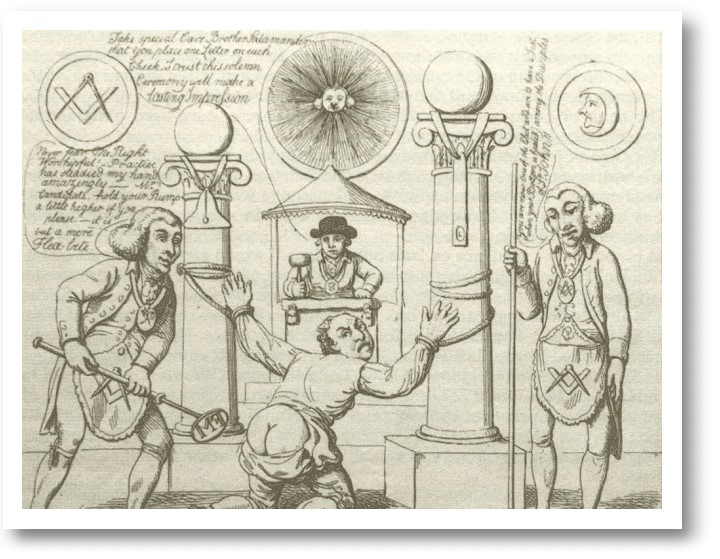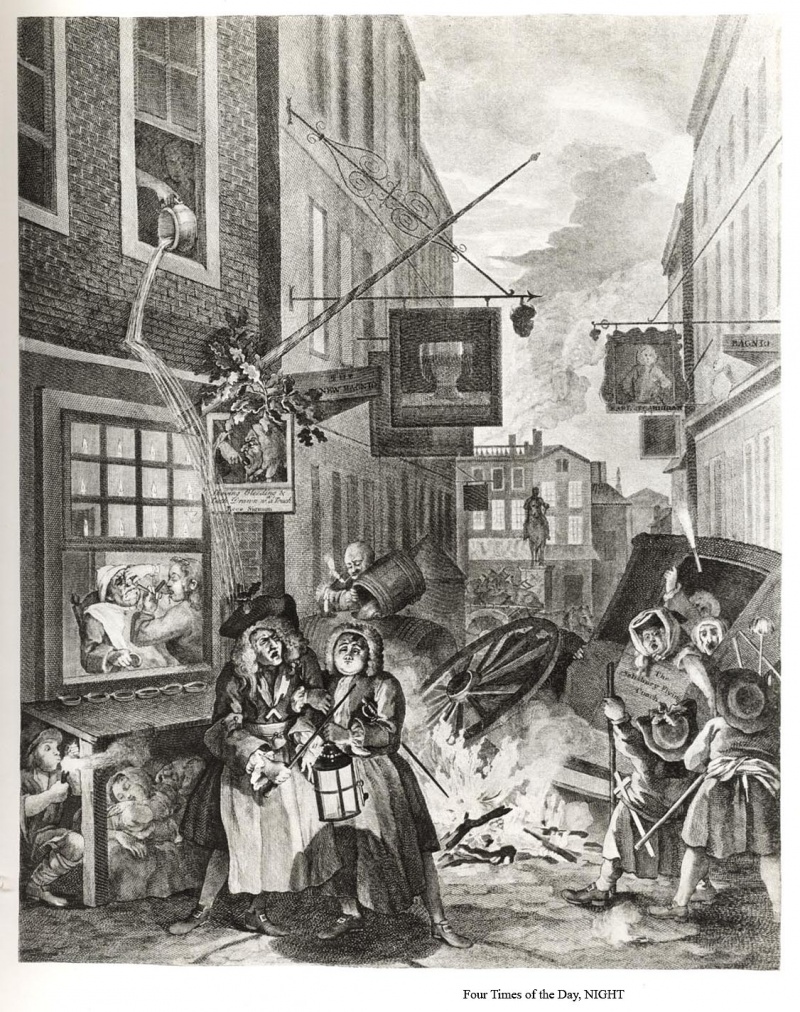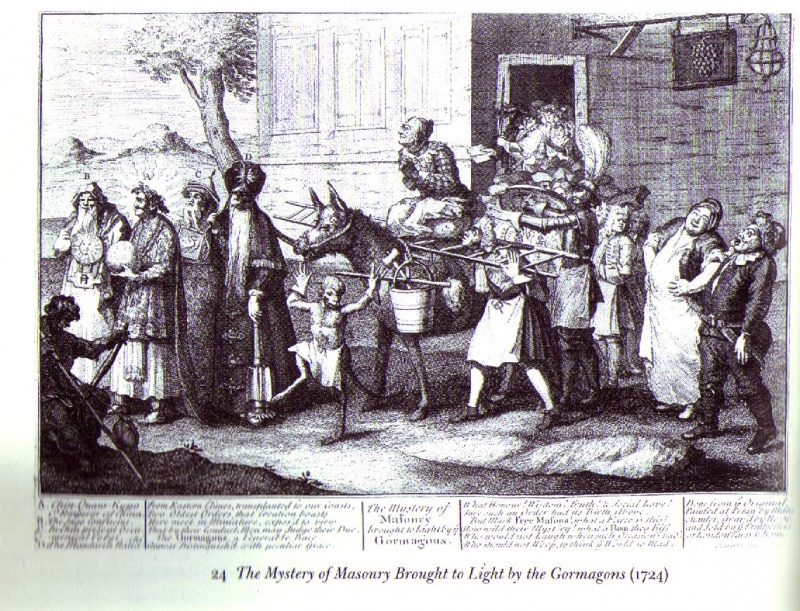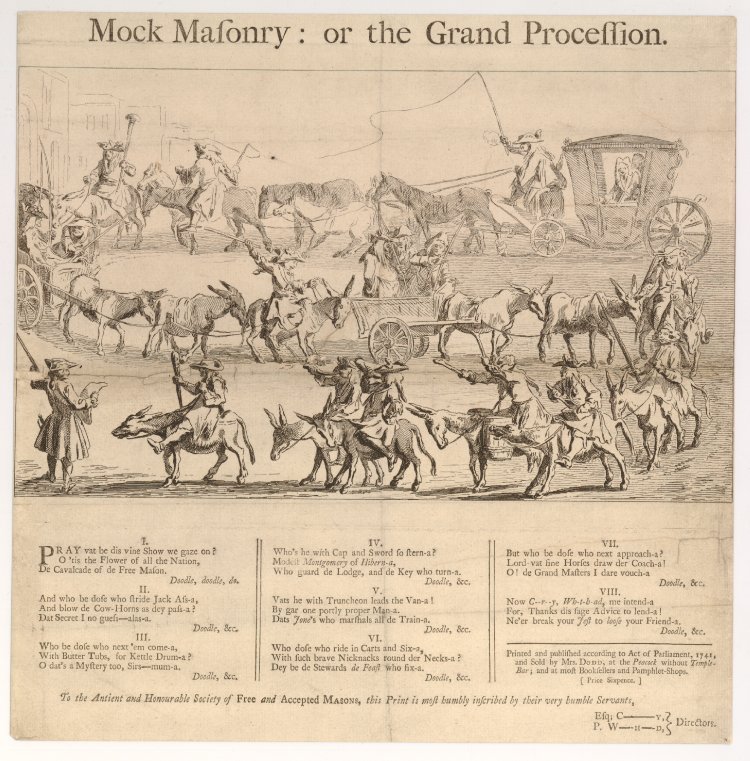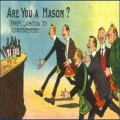En: Masonic Cartoons: Unterschied zwischen den Versionen
Keine Bearbeitungszusammenfassung |
Keine Bearbeitungszusammenfassung |
||
| Zeile 27: | Zeile 27: | ||
An engraving showing a Mock Masonry procession through the streets of London. Paul Whitehead, satirist and writer, set up the first Mock Masonry procession, using chimney sweeps, beggars and prostitutes as an attack on the pomp of the Grand Feast procession of the ‘Premier’ Grand Lodge, which ceased in the mid 1740s due to the public ridicule. Whitehead was a member of Dashwood’s Hell Fire Club and may have himself been a Mason who, like the Duke of Wharton before him, may have fell out with the ‘Moderns’. | An engraving showing a Mock Masonry procession through the streets of London. Paul Whitehead, satirist and writer, set up the first Mock Masonry procession, using chimney sweeps, beggars and prostitutes as an attack on the pomp of the Grand Feast procession of the ‘Premier’ Grand Lodge, which ceased in the mid 1740s due to the public ridicule. Whitehead was a member of Dashwood’s Hell Fire Club and may have himself been a Mason who, like the Duke of Wharton before him, may have fell out with the ‘Moderns’. | ||
== Cartoon-cards == | |||
<gallery> | |||
Bild:Card3.jpg | |||
Bild:Card5.jpg | |||
Bild:Card6.jpg | |||
Bild:Foxy.png | |||
</gallery> | |||
Version vom 5. April 2016, 11:34 Uhr
Masonic Cartoons
by Dr. David Harrison
Masonic satirical cartoons, like political cartoons, have been popular since the 18th century; from the 'Mock-Masonry' prints of the 1740s to the regular satirical sideswipes of the present period. Even William Hogarth, a Freemason himself, used Freemasonry as a satirical subject matter. Here are a few:
A satirical cartoon from c. 1800 revealing what is believed to be the pains of initiation - a subject matter that resurfaces many times in cartoons.
'Night' by William Hogarth. Hogarth was a Freemason, serving as a Grand Steward. This popular print was part of a series entitled 'Four Times of Day', a series that were originally four paintings that were completed in 1736. The engravings were published two years later. The engraving reveals a chaotic but satirical scene; the seemingly drunken Mason (the jewel reveals he may be the Worshipful Master of the lodge) is being escorted home by his steward or Tyler, oblivious to the chamber pot being emptied over his head. Violence erupts all around them as they stagger homeward. The sign of the 'Rummer and Grapes' can be seen - the tavern where one of the four lodges that founded the Premier Grand Lodge met. The Mason may be a representation of Thomas de Veil - an unpopular and hypocritical Bow Street Magistrate who gave harsh sentences to gin-sellers, even though he was a known drinker himself.
The Gormagons by Hogarth - a satirical sideswipe on the club founded by the Jacobite Duke of Wharton - a past Grand Master of the 'Premier' Grand Lodge. A number of people in the procession are wearing aprons, including the monkey. The Gormorgans (different spelling) did actually meet, and had a purpose of mocking Freemasonry - in a similar vein to 'Mock Masonry' but there is no evidence that they held a procession.
An engraving showing a Mock Masonry procession through the streets of London. Paul Whitehead, satirist and writer, set up the first Mock Masonry procession, using chimney sweeps, beggars and prostitutes as an attack on the pomp of the Grand Feast procession of the ‘Premier’ Grand Lodge, which ceased in the mid 1740s due to the public ridicule. Whitehead was a member of Dashwood’s Hell Fire Club and may have himself been a Mason who, like the Duke of Wharton before him, may have fell out with the ‘Moderns’.

